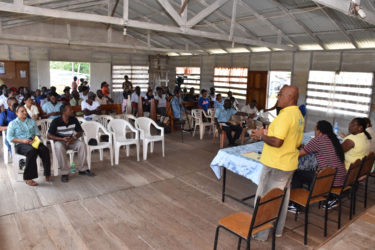This week’s initiative at Imbaimadai in the Cuyuni-Mazaruni District to mobilize miners without claims into groups known as syndicates will be extended to other regions of the country as part of government’s plan to broaden access to mining lands and by extension to the economic opportunities afforded by the mining sector.
Speaking with Stabroek Business on her return from Imbaimadai on Tuesday,

Minister within the Ministry of Natural Resources Simona Broomes said that the idea behind the creation of syndicates is to help respond to the shortage of both skilled and unskilled jobs by opening up additional opportunities in mining regions. “Syndicates are intended to help fulfil the ‘good life’ promise made by President [David] Granger. They seek to create jobs for people wishing to take advantage of the opportunity across the country,” Broomes said.
And according to the minister, syndicates will allow for equality in access to opportunity in the gold mining sector. “Syndicates seek to bring an end to the abuse and landlordism that often obtains in the sector and to bring about a more civilized arrangement. People in the sector who were deprived and taken advantage of in the past can now be afforded better opportunities,” Broomes said.
Stabroek Business has learnt that up to 500 miners could benefit from the earliest syndicate initiative. Broomes named Bartica, Konwaruk, Mahdia, Kurupung and Issano as some of the mining areas likely to see the blossoming of syndicates.
Many of the miners who will now benefit from the security of being attached to syndicates have led nomadic working lives, operating at one location or another. Broomes said the fact that they have, in many instances, accumulated mining equipment of their own means they can become involved in productive work quickly. “Syndicates allow for a fair opportunity. Most of these miners have had their equipment parked for some time and that has meant loss of income. They are equipped to begin operations now,” Broomes said, adding that part of the process will involve the fast-tracking of their operating licences.
And according to Broomes, syndicates are likely to alter the “ownership patterns” in the mining sector since hundreds of individuals and groups with varying levels of experience in mining have been expressing an interest in syndicates. “It will be a new experience for many of them but one understands that they have to begin somewhere,” Broomes said.
In order to ensure that the new syndicates become familiar with mining procedures and practices, the Guyana Geology and Mines Commission (GGMC) and its Mining School will be supporting the miners attached to the syndicates with training and orientation. “We understand that this is a new initiative that brings a difference to the sector and what we are determined to ensure is that the changes in the ownership patterns do not compromise compliance in all the phases of mining operations,” the minister said.
Syndicates will be allowed to operate under conditions that include proof that they have been involved in productive mining. “Renewal of licences will be based on evidence that you have been working the land,” she said, adding that syndicates will also benefit from such tax and other concessions as are accessible to the sector as a whole.





